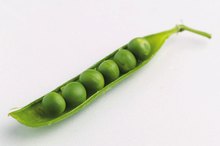Diet to Reduce Constipation & Gas
Planning a diet to minimize constipation and gas can be tricky, because many of the foods that can help with constipation may increase your risk for gas. The foods that cause gas vary, with some affecting certain people but not others. Limiting the gas-producing foods you eat while making gradual changes to your diet to reduce your risk for constipation can be the key to avoiding both constipation and gas.
Eat Your Veggies
Low-fiber diets are one of the main causes of constipation. Increasing the amount of fruits and vegetables you eat can help with constipation, because these foods tend to be high in fiber. Suddenly increasing your fiber intake, however, can cause gas until the bacteria in your body that break down fiber adjust to the increased fiber. Temporarily avoid dried beans, melon, raisins, prunes, bananas, avocados, apples, cucumbers, corn, green peppers, kohlrabi, leeks, onions, radishes, rutabaga, broccoli, cabbage, turnips, brussels sprouts and cauliflower, which can cause gas. Eat canned fruits, applesauce, nectarines, grapes, plums, kiwi, carrots and squash instead, gradually adding back the other fruits and vegetables to see which increase your gas.
Drink Up
How to Treat Gas Pain After Laparoscopic Gallbladder Surgery
Learn More
Drinking at least 8 cups of liquid each day may also help with constipation. Avoid milk if you're lactose intolerant, and don't drink any carbonated beverages, or you may increase your risk for gas. Some people also have difficulty digesting fructose, so avoiding fruit juices, such as apple or pear juice, can also help keep you from getting too gassy.
Go for Grains
Limiting whole grains may help reduce gas, but the fiber in these grains will help with constipation. Temporarily avoiding whole grains and gradually switching from refined grains to whole grains may help you increase your fiber intake without greatly increasing your gas. Try different whole grains, as some grains may be more likely to cause you to feel gassy than others.
Pack in Protein
Pregnancy Diet to Avoid Gassiness
Learn More
Protein-rich foods aren't likely to cause gas, but limit protein foods high in fat. Good choices for minimizing both gas and constipation include turkey, chicken, fish, smooth peanut butter and eggs cooked without added fat. If dairy products don't bother you, lowfat plain yogurt or cottage cheese are also good, protein-rich food choices.
Related Articles
References
Writer Bio
Based in Massachusetts, Jessica Bruso has been writing since 2008. She holds a master of science degree in food policy and applied nutrition and a bachelor of arts degree in international relations, both from Tufts University.








